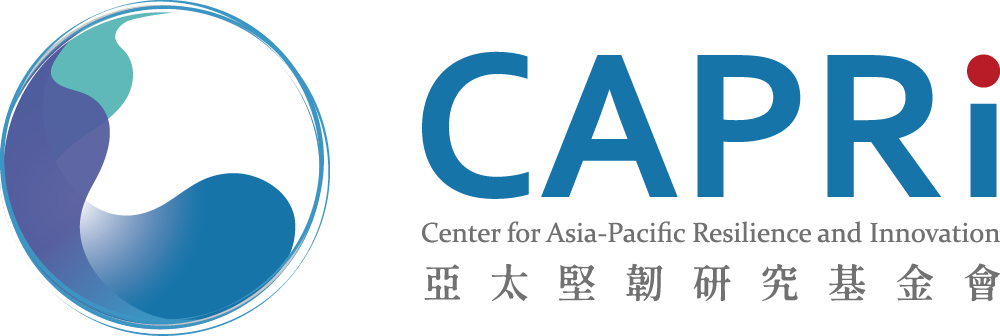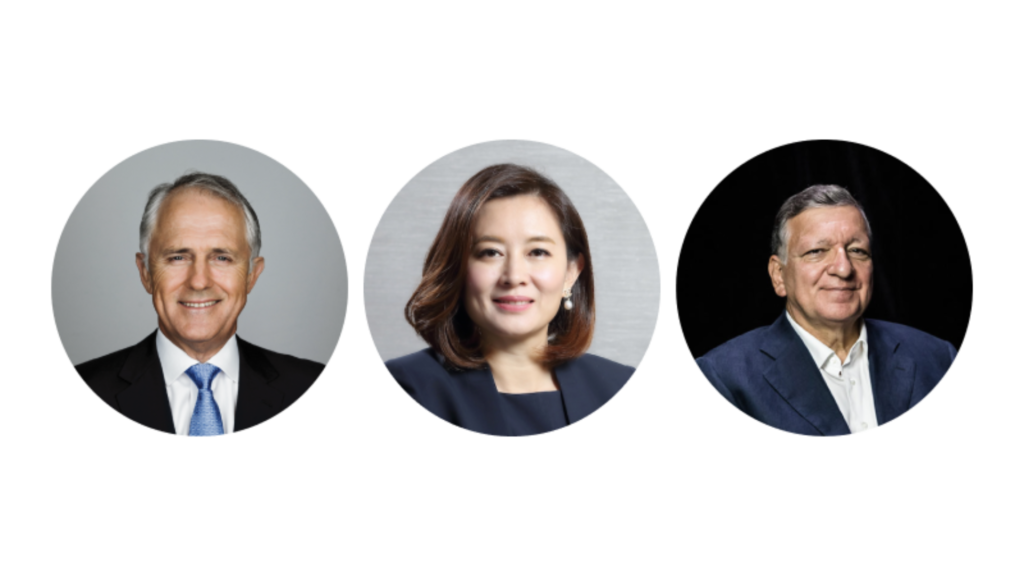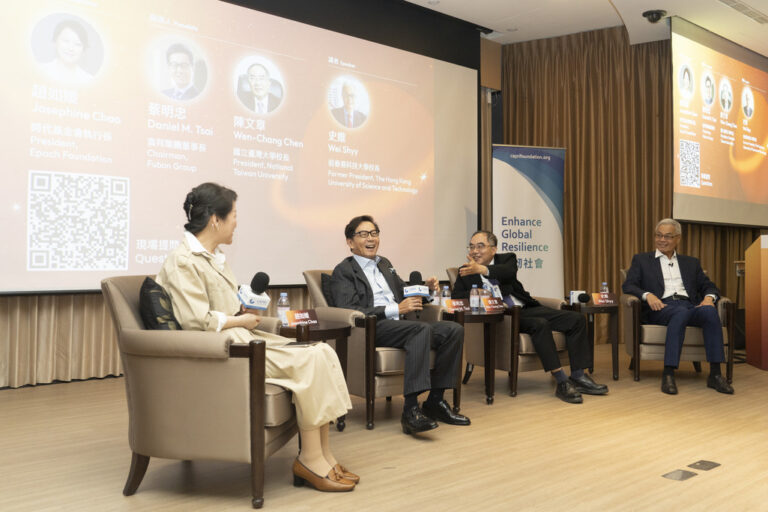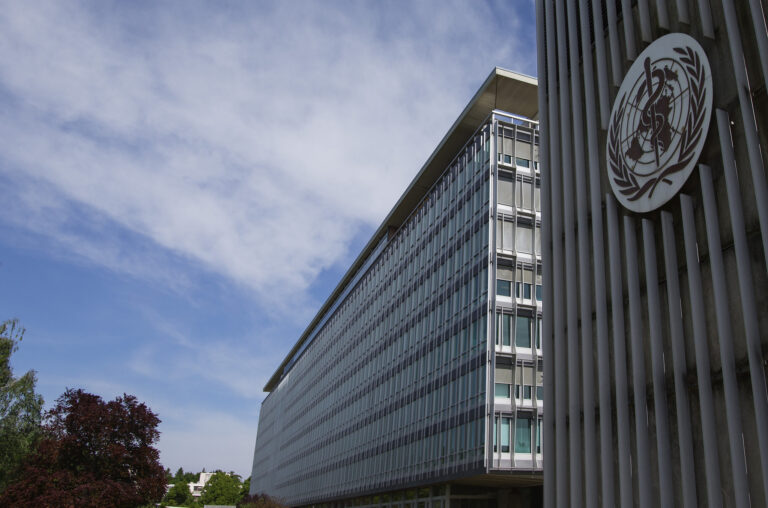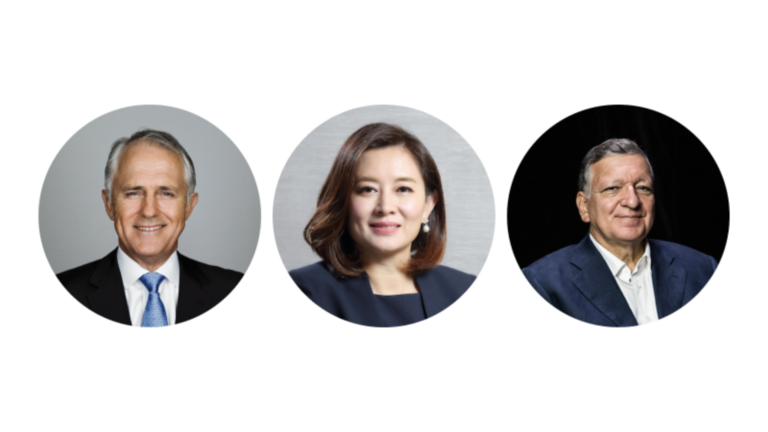Malcolm Turnbull, Shirley Lin, and José Manuel Barroso are founding members of the Center for Asia-Pacific Resilience and Innovation (CAPRI), a new non-partisan international public policy think tank headquartered in Taipei. Malcolm and Shirley worked at GS from 1997 to 2001 and from 1993 to 2003, respectively. Malcolm headed the Australian office and became partner in 1998, while Shirley headed the Principal Investment Area in Asia and was the youngest woman and the youngest Asian to become a partner in 2000. José Manuel has advised the firm since 2016, first as Chairman of GS International and currently as Chairman of International Advisors. Shirley has also been on the board of GS Asia Bank since 2014.
1. How did you start your careers at Goldman Sachs, and what were your paths at the firm? What did you learn during your time here that helped you in the next phase(s) of your careers?
SHIRLEY:
I started in investment banking right after college, and I chose to work at Morgan Stanley in New York for my first two years as an analyst. In my third year, I was sent to Hong Kong. I realized how well positioned Goldman Sachs (GS) was to become a global firm, so I joined the firm in 1993 as an associate in investment banking specializing in privatization and working with the Singapore, Chinese, and Philippine governments. In 1997, I joined the Principal Investment Area (PIA), where I led the firm’s investments in 12 countries in the Asia Pacific. I focused primarily on China, particularly in technology investment, and worked closely with Hank Paulson, who led the firm’s expansion in China. I helped the firm found companies such as Alibaba and Semiconductor Manufacturing International Corporation (SMIC) and met many colleagues who became lifelong friends, including Malcolm. As the firm expanded in the region, I played a role in setting up the Singapore office in 1994 and expanding PIA in Japan in 1999. I made partner in 2000.
MALCOLM:
I joined the firm in 1997, when we effectively sold my 10-year-old investment banking firm Turnbull & Partners to GS, and I became the Australian chairman. In 1998, I became a partner of the firm. I was persuaded to join the firm by John Thornton; we shared the same global vision and interests, not to speak of a passion for politics! The timing was perfect as the firm went public a few years later, but that wasn’t foreseen, at least by me. Better to be lucky than smart, I guess. It was a great move—not necessarily financially. We had a very successful but nascent private equity business underway, and that closed with an unknown opportunity cost. GS was of course the perfect preparation for a political career.
JOSÉ MANUEL:
I joined GS in 2016 after many years in politics, including 12 years in the Government of Portugal as Prime Minister and Foreign Minister, and between 2004 and 2014 as President of the European Commission during two mandates. The first person to suggest to me this “switch” was the late Peter Sutherland, a very good friend, and l succeeded him as Chairman of the Board of Goldman Sachs International in London. Among other conversations, those l had with Lloyd Blankfein and Richard Gnodde convinced me it could be a good move for me and for the firm. Since April this year, l have been Chairman of International Advisors at the firm. I particularly enjoy participating in GS conferences and sharing my analysis of European and global developments, namely on geopolitics (and trying to link them to major economic and financial trends and events), with many of our clients.
2. In 2022, you founded CAPRI, an international research organization that seeks to promote innovative public policy, improve governance, and build resilient societies in the Asia Pacific and beyond. Tell us about what inspired you to start CAPRI and about your journey from the inception of the idea to now.
SHIRLEY:
By working with two think tanks, the Miller Center at the University of Virginia and Brookings Institution, I have witnessed the need for the Asia Pacific to have its own public policy think tanks, so when the current Minister of State for Science, Innovation and Technology George Freeman, MP, established the Reform for Resilience Commission with Malcolm and José’s help, I saw an opportunity to fill this role. Created in spring 2020, Reform for Resilience sought to utilize the nascent COVID-19 pandemic as a wake-up call for policymakers, demonstrating the interconnections of health, economy, and environment in creating productive and prosperous societies. The notion of resilience underpinned this thinking—how can we ensure society is more ready to prevent, prepare for, and respond to major shocks, such as the COVID-19 pandemic or the financial crisis of 2008-09?
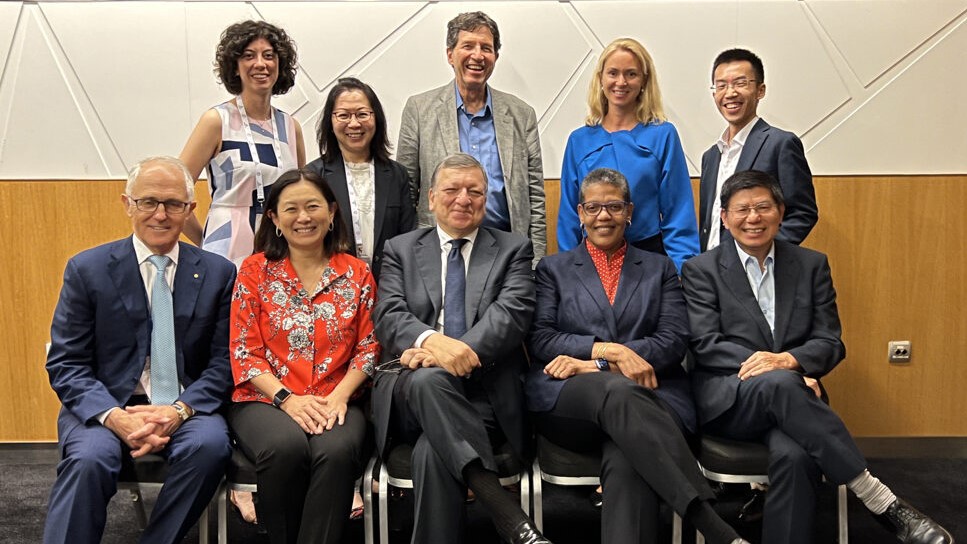
JOSÉ MANUEL:
Malcolm and I joined Reform for Resilience as Co-Chairs, alongside the then Dean of the Harvard Chan School of Public Health, Michelle A. Williams. We could see the immense value in bringing together different perspectives on the topic from academia, industry, and the public sector as well as ensuring geographical diversity. My experiences leading the European Commission during the 2008 financial crisis had demonstrated very clearly to me the need for cross-border collaboration in tackling a truly global phenomenon such as the pandemic, something I have seen firsthand as Chair of Gavi, the Vaccine Alliance. Many countries in the Asia Pacific responded strongly to the early waves of COVID-19, having learned from their experiences with SARS in the early 2000s, by innovating their health systems and public communications to react quickly and in a robust way to combat the virus. With this in mind, we sought an Asia-Pacific perspective on the topic of resilience.
MALCOLM:
I didn’t know George Freeman, but he was recommended to me by two friends and former UK Prime Ministers Tony Blair and David Cameron. COVID was a unique challenge—not the first pandemic by any means, but the first that was spreading at the speed of a jetliner and so presenting every government in the world with the same challenge at the same time. Inevitably this meant that some governments and societies would handle the pandemic better than others. How do we learn from our successes and mistakes and build resilience for the future? That was George’s big idea, and it was one I embraced. As we were building a global team of advisors and collaborators for what became known as the Reform for Resilience Commission, I reached out to Shirley. Her combination of energy, eloquence, intellect, and determination was unique. Calling her a “force of nature” doesn’t remotely do her justice. So, I knew that if she became interested, we would secure a formidable partner. At the same time, Taiwan, where Shirley lives, was handling the pandemic better than most and was not getting either the attention or the credit that it deserved. Shirley quickly assembled a small team in Taiwan, establishing the Reform for Resilience Asia-Pacific Hub in early 2021. Throughout 2021 and the first half of 2022, the Hub carried out research and produced publications, helping coordinate Reform for Resilience’s activities in the region and globally, promoting the Asia-Pacific perspective. When you have the right people, things get organized very quickly.
SHIRLEY:
After retiring from GS, I took some time off for research and graduate study at the University of Hong Kong—first a master’s degree, then a doctorate in political economy. I now teach at the Chinese University of Hong Kong, the University of Virginia, National Chengchi University in Taipei, and Tsinghua University in Beijing, with a focus on public policy and international relations. Combining what I learned from my time in the private sector and academia, moving into the field of public policy was a natural progression, so I was thrilled when Malcolm reached out to me regarding the Reform for Resilience Commission. In early 2022 and with Malcolm and José’s encouragement, I spoke with a few early supporters in Taiwan who agreed that the Asia-Pacific region should make a bigger contribution to global resilience and share the region’s experience with others. With supporters including Fubon Group, Acer, MediaTek, and TSMC on our founding board, we created CAPRI as an independent entity focused on enhancing resilience and promoting innovative governance, drawing on the experiences of the Asia Pacific. We officially announced CAPRI’s establishment at the World Economic Forum’s Annual Meeting in Davos in May 2022. The 16 months since then have been a bit of a blur! Malcolm now chairs and José sits on the CAPRI International Advisory Council. We have hosted over a dozen events, including our launch at the University of Virginia with Malcolm and his wife Lucy Turnbull to discuss democratic governance in a populist age. We have partnered with numerous institutions across the globe on research and developed an extensive network around the region. Our core topics of governance, innovation, and resilience have resonated more widely than any of us imagined.
On May 29, CAPRI hosted its first Annual Forum in Taipei. What did you set out to accomplish with this event and did you achieve your goals?
SHIRLEY:
The Annual Forum was an important milestone for CAPRI, showing how far it had come in only 12 months. While CAPRI had built a strong network in the research and public policy sectors, we felt it was still misunderstood by many, including in the media. As the first international NGO to be founded in Taipei, we aim to create an Asia-Pacific network of organizations and individuals focused on public policy and good governance—in short, societal resilience. We had hosted public forums previously, but perhaps due to the identity of some of our speakers at these events, many still assumed CAPRI was focused on international security and geopolitics, like so many other more established think tanks around the world. The Annual Forum was an opportunity to correct that image and more accurately present ourselves to a wide audience. Most importantly, we brought together experts from all over the world, including Australia, New Zealand, Malaysia, South Korea, and the Philippines, and leaders from Europe and the United States with a strong focus on public health.
MALCOLM:
Zoom has its charms, but there is no substitute for getting people together in person. The value of conferences is just as much, if not more, in the informal interactions between participants than the scheduled presentations. So, the Annual Forum was a very important milestone for CAPRI, the first big in-person gathering and the first after the pandemic. Resilience was of course the theme of the Forum, and it is hard to think of any place where resilience is more engrained than in Taiwan. Having said that, CAPRI was careful not to get into contentious political territory but draw lessons of resilience from Taiwan and further afield that could be widely applied. The proceedings were well received, and reported, at the time and continue to connect with audiences across the region—the recording had over 1,000 views in the first 24 hours after the Forum and has now been watched nearly 30,000 times. Measuring impact can sometimes be a challenge, but with numbers like these, we can clearly see that the work of CAPRI is of interest and value to a wide audience, cementing our belief in CAPRI’s aims.
3. What are you most proud of accomplishing since founding CAPRI just last year?
MALCOLM:
Personally, the Annual Forum in May was a highlight. It was my first visit to Taiwan, but it certainly won’t be my last. Now I can’t take any credit for the event, that all goes to Shirley and her team, but I was struck by just how engaged the local audience, online viewers from across the world, and the Taiwanese media were with the work of CAPRI. It was a clear demonstration that the region is crying out for greater engagement on the global stage and that CAPRI is fulfilling the role.
JOSÉ MANUEL:
Sadly, I was unable to attend the Forum, but the quality of speakers and the engaging content shone through on the livestream. I believe this success in part results from CAPRI’s strong commitment to breaking down the silos between academia, the private sector, and public policy makers. Bringing together leaders from different fields sparks new insights, resulting in lively debate and ultimately policy recommendations that are practical, actionable, and beneficial for everyone. This may seem like an obvious notion, but it is one that is underutilized in today’s society.
SHIRLEY:
Being on the ground in Taipei, I have enjoyed seeing my team grow month after month, attracting new talent from Taiwan and abroad. Having started with just 4 members of staff, as of September we now have 16 from Australia, Brunei, Poland, Hong Kong, Taiwan, the United Kingdom, and the United States, all drawn to CAPRI’s mission. Similarly, we have assembled a stellar International Advisory Council of experts from across the world, including José Manuel and Malcolm, who have offered their time and support CAPRI pro bono. With a dedicated staff supported by leaders in their fields, CAPRI has quickly built a strong foundation on which its future growth can flourish.
4. As you look to the future, what are your ambitions for CAPRI over the next few years?
JOSÉ MANUEL:
CAPRI’s ambition to place the Asia-Pacific voice at the heart of global dialogue is an important one. We often witness policy with worldwide impact being decided by a few major actors, with little consideration for the repercussions to other nations. By bringing together individuals and organizations from across the diverse Asia-Pacific region, CAPRI can help present opinions from a region with so much to offer the rest of the world, one that is often overlooked or discounted. To this end, I would like to see the International Advisory Council expanded further with more experts from the region who will further strengthen CAPRI’s understanding of the issues and challenges facing the Asia Pacific as it emerges from the pandemic.
MALCOLM:
To date, there has been a limited think tank tradition in our region of East and Southeast Asia, so CAPRI plays a leading role in that regard. More importantly, there is a tendency to see this region through the perspectives of the superpowers: Beijing, Washington, and to a lesser extent, Tokyo. But if we continue to see this region as a series of spokes going into the imperial hubs, then we are destined to continue to be dominated by great power rivalries. It is more important than ever to see the region as a mesh where security and prosperity are bound up in interlocking relationships between all nations, large and small, and where the medium-sized economies like those of ASEAN, Japan, South Korea, Australia, and Taiwan look to each other and are not simply mesmerized by the People’s Republic of China and the United States of America.
We have so much to learn from each other—and CAPRI can help build awareness, trust, and stronger ties between the countries of the region. While I was prime minister of Australia, I was determined to demonstrate that we could act cohesively and effectively without the superpowers, and the continuation of the Trans-Pacific Partnership after the United States pulled out in 2017 is a good example of that. Now called the CPTPP, it has neither China nor the US as members, and the United Kingdom has just joined as the 12th member.
There are so many examples of innovative policy in the region that are overlooked. By tapping into these nuggets, CAPRI can promote best practice from across the region, having an impact beyond its borders. And while many governments in the Asia Pacific should be applauded for their response to the pandemic, I can’t help but reflect that if there had been more regional cohesion, the response could have been even better. This is an area where organizations such as CAPRI can add meaningful value, supporting international interaction and breaking down siloed thinking so that the best ideas reach policymakers wherever they are.
SHIRLEY:
I am looking at the next few years for CAPRI as a period of further growth. We have bigger offices lined up, allowing us to grow our team and continue to attract top talent to Taipei. Building out our research to cover a broad range of topics will demonstrate CAPRI’s ambition to become the premier think tank in the region. We are also expanding internationally, registering as a 501(c)(3) in the United States to bolster our overseas ambitions. By having bases on both sides of the Pacific, CAPRI will be in an even stronger position to advocate for more resilient societies.
5. Have you leveraged your GS network to build CAPRI? If so, how?
MALCOLM:
CAPRI would not have happened without Goldman Sachs, because that is where Shirley and I first met. This qualifies GS for a merger fee; however, because CAPRI is a not-for-profit foundation, the fee should be paid by GS to CAPRI!
SHIRLEY:
CAPRI’s first hire, our Director of Administration Cecilia Yin, worked at GS for two decades prior to joining CAPRI. Originally based in Hong Kong, Cecilia relocated to Taiwan during the pandemic and was instrumental in the founding of CAPRI. My time in GS PIA has also been crucial for CAPRI’s success. It was there that I first encountered many of the Center’s supporters as leaders of forward looking, innovative companies and individuals seeking to make a difference in the Asia Pacific. I believe it also enhanced my credibility in their eyes when I approached them regarding CAPRI. They were familiar with my work at the firm and had confidence in my drive and ability to make CAPRI a success.
6. Have you leveraged your GS network since leaving the firm? If so, how?
SHIRLEY:
Technically I am still at the firm, serving on the board of the GS Asia Bank. And the GS network of friends and experts, many of whom have devoted themselves to public service like Malcolm and José, has inspired me. The people I have met at the firm, especially those who developed the firm’s international business, have become the foundation for my establishing CAPRI. I met entrepreneurial people who bring innovative ideas to the Asia-Pacific region, and I recruited many talented bankers in the Asia Pacific to join the firm. This has been immensely helpful to me in reaching out to people with diverse expertise in different countries and connecting the public and private sectors around the world.
MALCOLM:
Well, I hesitate to make a Hotel California reference, but I am not sure you ever really leave the firm, or at least the GS community. The alumni network is so vast and represented so widely that former GS people are found everywhere. It was a special delight when I was prime minister of Australia to meet Phil Murphy as Governor of New Jersey and Gary Cohn, who was advising President Trump on economics. Both of them continued to be undaunted by the barely possible.
